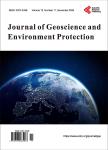Clay Minerals Channels Identification in the Tindikala-Boutou Area (Eastern-Cameroon) along the Kadey River Using Direct Current (DC) Method
Clay Minerals Channels Identification in the Tindikala-Boutou Area (Eastern-Cameroon) along the Kadey River Using Direct Current (DC) Method作者机构:Department of Petroleum and Gas Explorations Institute of Mines and Petroleum Industries University of Maroua Maroua Cameroun Department of Applied Geophysics Geology and Mining Exploitation College University of Ngaoundéré Ngaoundéré Cameroun Department of Physics Faculty of Science University of Yaounde I Yaoundé Cameroon Department of Physics Advanced Teacher’s Training College University of Yaounde I Yaoundé Cameroon
出 版 物:《Journal of Geoscience and Environment Protection》 (地球科学和环境保护期刊(英文))
年 卷 期:2015年第3卷第6期
页 面:123-133页
学科分类:1002[医学-临床医学] 100214[医学-肿瘤学] 10[医学]
主 题:Geoelectrical Surveys Direct Current Method Resistivity Shear Zones Clay Minerals
摘 要:To achieve the current study, geoelectrical surveys along six (06) profiles of 4 km long in a 100 m × 200 m grid defined according to the triangulation principle in the Tindikala-Boutou (Eastern-Cameroon) area along the Kadey River have been made through electrical sounding and profiling following Schlumberger array. The instrument is the resistive meter Syscal Junior 48 (IRIS Instrument). The data have been processed and modelled with Res2Dinv and Winsev softwares, and then interpolated with Surfer software. Investigation method used is the Direct Current (DC) method. Interpretations and analyses of results from the investigation method highlight weak zones or conductive discontinuities. The latter has been identified as shear zones within granitic structures of the Precambrian basement, according to the geologic and tectonic background of the area. The structural trend of these shear zones is E-W approximately. The mineralization characterized by conductive zones proves the presence of clay minerals disseminated in weathered quartz vein, which cross the shear zones. The intense activities of gold washers encountered in the studied area are able to attest the presence of clay minerals concentrations.




